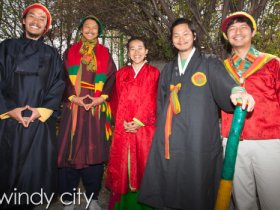 [Windy City is: (left to right) Kim Ban-jang on drums and lead vocals, Ra Guk-san on percussion and chorus, Beck Jung-hyun on the melodica and keyboards, Shin Jae-won on the didgeridoo, percussion and chorus, Oh Jin-woo on guitar, and Noh Sun-tek (squatting) on bass guitar. Photo courtesy of Windy City.]
[Windy City is: (left to right) Kim Ban-jang on drums and lead vocals, Ra Guk-san on percussion and chorus, Beck Jung-hyun on the melodica and keyboards, Shin Jae-won on the didgeridoo, percussion and chorus, Oh Jin-woo on guitar, and Noh Sun-tek (squatting) on bass guitar. Photo courtesy of Windy City.]
Formed in Seoul in 2004, Windy City's (a name paying homage to Soul mastermind Curtis Mayfield’s record label) drummer Kim Ban-jang spoke in-depth with Jonathan Cha of KoreAm (The Korean American Experience) on everything from their early beginnings and visiting Jamaica for the first time to their earliest Reggae memory and why their form of Reggae can be classed as Cheonggukjang Reggae.
On his earliest Reggae Memory: “I watched Bob Marley sing “Stir It Up” on cable TV. It was so laid-back and comfortable. But, he sang with such a serious face. It sounded strange to me the first time, but it had a really big impact. The sounds were slow and nice, very melodic with a good harmony. As a drummer, I enjoyed listening to the beat. It was a very different style. Instantly original.”
On visiting Jamaica: "In 2009 and 2010, I visited the Blue Mountains in Jamaica. I stayed at a Rasta village where they only played Nyahbinghi Reggae. I stayed two months the first time, and two weeks the second.
Jamaica was a culture shock to me. I was really confused about my life at that time because I couldn’t accept the lifestyle, the Rasta lifestyle, the chanting, Nyahbinghi and the farming. They make their own houses. They make their own musical instruments. Everything is an art. I am a city boy. The city, Seoul and I, we grew up together. I was confused about my life and my music, so that trip was not easy for me. When I came back to Korea, my point of view changed. My life changed. Before, I would mix reggae and funk, but after Jamaica, my concentration moved from only a fat bass line and a Nyahbinghi jumping drum. I wanted different melodies, round melodies like “Arirang,” something that makes an impact. Reggae, combined with roots and culture.
I thought about how Jamaican roots and culture are so alive, and Korean roots and culture are hard to find. Korea’s modern history is so sad. Where are my roots and culture? What is my origin? I see Reggae, but where is my origin? I want to meet with people who still have memories about Korea’s past. This movement, it is very important to me."
On their style of Reggae being dubbed ‘Cheonggukjang’: "Cheonggukjang is a traditional meal with a deep, rootsy taste. It takes a long time to make and has a funky smell. Generation to generation, the traditional meal is linked to history. But they have been forgotten. People choose to forget, and time moves forward. No matter how famous you are, you still have to eat. These are unchangeable realities, the foundation of humanity. Music is food for the soul. When I listen to music, I can taste it. Reggae has the ackee-and-salt-fish (a traditional Jamaican dish) taste. Music, the taste of food and language are similar. Music is mental food. Food is the energy of life and very important for each culture. So, I share the farmer’s philosophy: plant the seed, grow and harvest. Instant food has no roots."
You can check out the extended interview here: http://iamkoream.com/january-issue-korean-reggae-pioneers-make-music-for-the-soul/













 less
less
 more
more